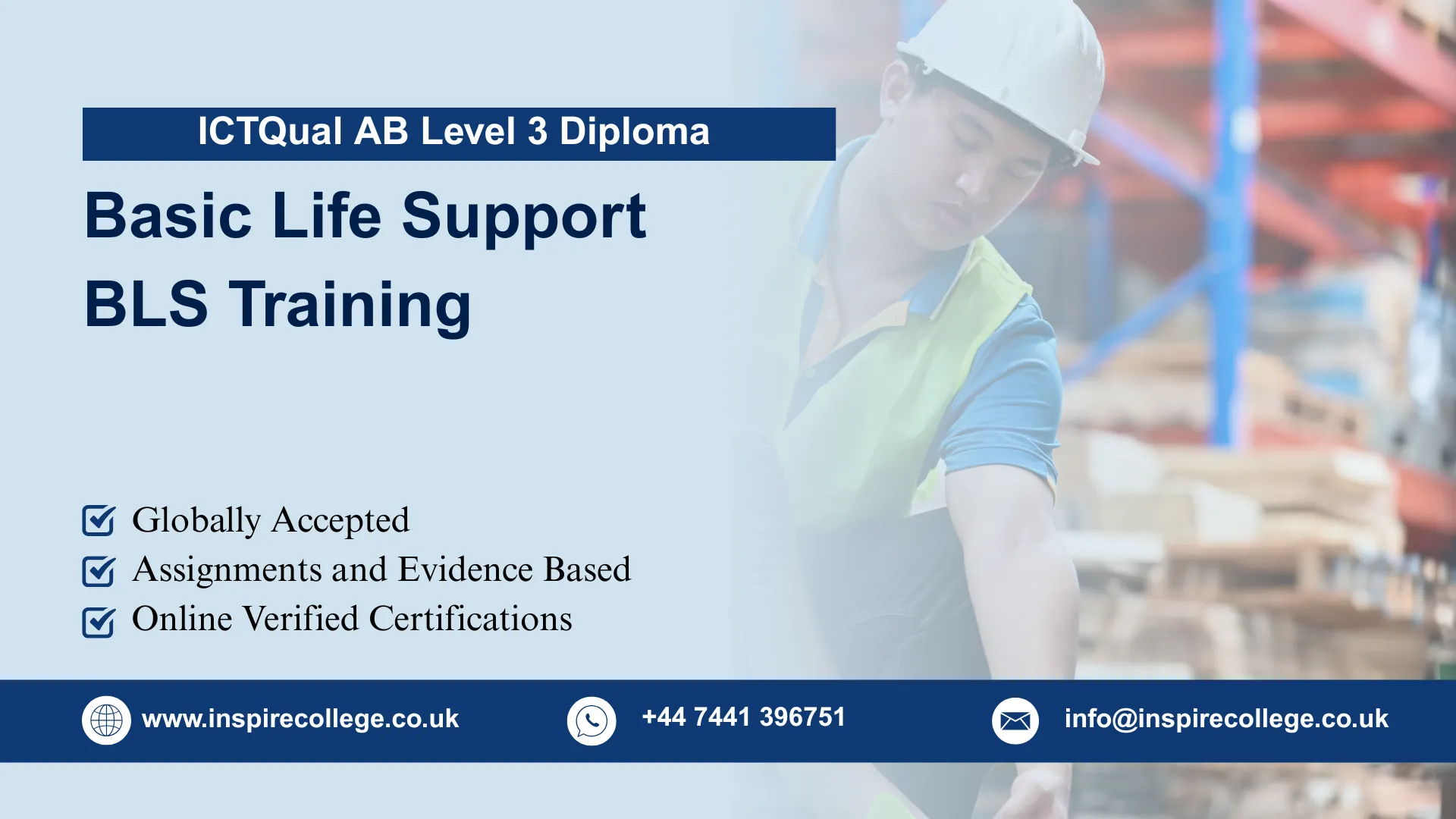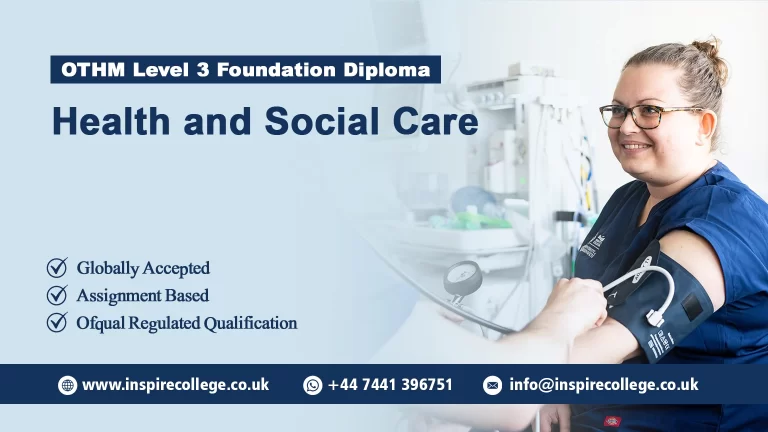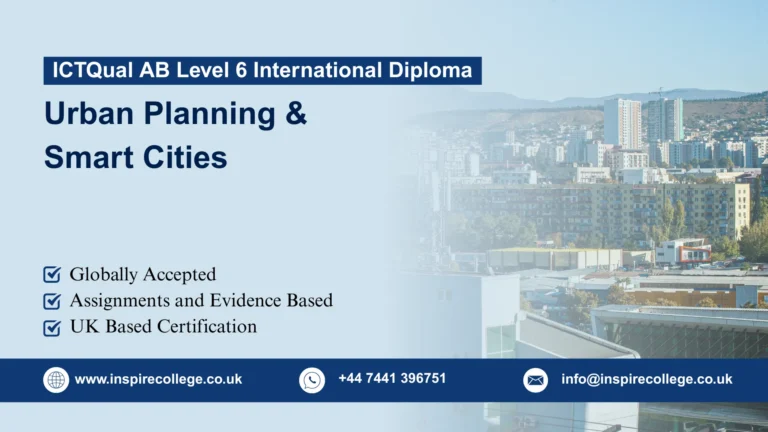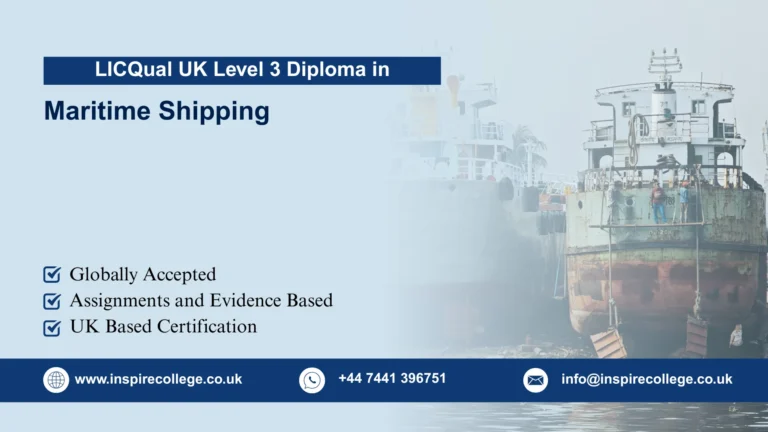
ICTQual AB Level 3 Diploma in Basic Life Support BLS Training
In emergency situations, the ability to provide prompt and effective life support can make the difference between life and death. The ICTQual AB Level 3 Diploma in Basic Life Support (BLS) Training equips learners with the essential knowledge and practical skills needed to respond confidently to cardiac arrest, choking, and other life-threatening emergencies. This qualification is highly relevant for healthcare professionals, first responders, and individuals working in environments where emergency medical intervention may be required.
The purpose of ICTQual AB Level 3 Diploma in Basic Life Support BLS Training is to develop learners’ competence in delivering Basic Life Support, ensuring they understand the principles of cardiopulmonary resuscitation (CPR), the use of automated external defibrillators (AEDs), and emergency response procedures. Learners will gain hands-on experience in applying these techniques safely and effectively, enhancing both their professional capability and their ability to protect lives in critical situations.
Throughout the programme, participants will also learn to assess emergency scenarios, prioritise actions, and maintain the safety of themselves and others. Emphasis is placed on practical training, simulated exercises, and adherence to current health and safety standards and professional guidelines. By combining theory with practical application, learners will develop confidence, precision, and decision-making skills that are vital for high-pressure emergency situations.
Upon completion of the ICTQual AB Level 3 Diploma in Basic Life Support (BLS) Training, learners will be fully prepared to perform lifesaving interventions in clinical and community settings. ICTQual AB Level 3 Diploma in Basic Life Support BLS Training not only enhances employability and professional credibility but also ensures that learners can act decisively and effectively during critical emergencies, making it an essential training programme for anyone committed to safety, health, and emergency preparedness.
The ICTQual AB Level 3 Diploma in Basic Life Support (BLS) Training is designed for individuals from diverse backgrounds who meet specific entry criteria to ensure a productive learning environment and full engagement with the course content. These requirements are intended to prepare learners for the physical, theoretical, and practical demands of life support training.
Minimum Age
Participants must be at least 18 years old. This age requirement ensures learners have the maturity and responsibility necessary to safely apply life-saving techniques and follow emergency protocols.
Educational Background
While no formal academic qualifications are required, learners with a basic understanding of healthcare, first aid, or emergency response may find it easier to grasp theoretical concepts and practical applications. This foundational knowledge can support faster learning and better retention of skills.
Physical Fitness
Learners should have the physical capability to perform demanding tasks such as CPR, patient handling, and the use of emergency equipment. Good physical fitness ensures that participants can safely and effectively carry out life-saving procedures.
English Proficiency
A good level of English communication skills is essential to understand course instructions, participate in discussions, and respond accurately during simulated or real-life emergency scenarios. Effective communication is critical in life-saving interventions.
Commitment to Health and Safety
Learners must demonstrate awareness of infection control, hygiene practices, and workplace safety regulations to maintain a safe environment for both themselves and others during training and in professional practice.
Prior Experience (Optional)
Although not mandatory, learners with previous experience in healthcare, first aid, or emergency response will benefit from contextual knowledge and practical insight, which can enhance understanding and confidence during the course.
These entry requirements ensure that all participants are well-prepared to fully engage in the ICTQual AB Level 3 Diploma in Basic Life Support (BLS) Training, gain essential skills, and perform life-saving interventions safely and effectively.
Mandatory Units
The ICTQual AB Level 3 Diploma in Basic Life Support BLS Training qualification consists of 6 units and 18 Credits for the complete qualification.
- Comprehensive Emergency Life Support
- Advanced Airway and Respiratory Management
- Trauma Life Support and Multi-System Emergencies
- High-Performance Resuscitation Techniques
- Pharmacological Interventions in Life Support
- Leadership, Crisis Management, and Team Coordination
Comprehensive Emergency Life Support
- Learners will understand the principles of emergency life support and their application in critical and high-pressure situations.
- They will be able to identify life-threatening conditions and initiate appropriate interventions effectively.
- Learners will demonstrate proficiency in performing cardiopulmonary resuscitation (CPR) and defibrillation.
- They will assess and manage patients experiencing cardiac, respiratory, and neurological emergencies, applying evidence-based practices to optimise outcomes.
Advanced Airway and Respiratory Management
- Learners will recognise and respond to airway obstruction and respiratory distress across different patient groups.
- They will develop skills in advanced airway management, including the use of endotracheal intubation and supraglottic airway devices.
- Learners will apply oxygen therapy and ventilation strategies tailored to patient needs.
- They will understand the physiological impact of respiratory failure and implement appropriate interventions to stabilise patients.
Trauma Life Support and Multi-System Emergencies
- Learners will assess and manage trauma patients using structured approaches, including primary and secondary surveys.
- They will identify and treat life-threatening traumatic injuries such as haemorrhagic shock, fractures, and head trauma.
- Learners will apply principles of spinal immobilisation, wound management, and haemorrhage control.
- They will coordinate care for multi-system trauma patients in both pre-hospital and hospital settings.
High-Performance Resuscitation Techniques
- Learners will implement evidence-based resuscitation techniques aimed at improving survival rates in cardiac arrest cases.
- They will demonstrate high-performance, team-based resuscitation, optimising individual roles and responsibilities.
- Learners will apply rapid assessment and intervention strategies in high-pressure scenarios.
- They will evaluate post-resuscitation care and identify strategies to enhance patient outcomes.
Pharmacological Interventions in Life Support
- Learners will understand the pharmacokinetics and pharmacodynamics of emergency medications.
- They will administer life-saving drugs in accordance with emergency protocols and patient-specific conditions.
- Learners will recognise indications, contraindications, and potential adverse effects of medications used in life support.
- They will integrate pharmacological interventions with other life-saving techniques to provide optimal patient care.
Leadership, Crisis Management, and Team Coordination
- Learners will develop leadership skills for managing emergency medical teams in high-stress situations.
- They will implement effective communication, decision-making, and situational awareness strategies during life-threatening emergencies.
- Learners will coordinate multi-disciplinary teams to ensure efficient and effective patient care.
- They will apply crisis management principles to improve response efficiency and overall team performance during emergencies.
The ICTQual AB Level 3 Diploma in Basic Life Support (BLS) Training provides learners with a solid foundation for advancing their careers in emergency medical response, healthcare, and related fields. This qualification equips participants with essential skills, practical knowledge, and professional competencies, opening pathways to specialised training, higher-level certifications, and diverse career opportunities.
Advanced Life Support (ALS) Certification
Learners can progress to more specialised training in advanced resuscitation techniques and critical care interventions, such as Advanced Life Support (ALS) certification, enhancing their ability to respond to complex medical emergencies.
Pre-Hospital Emergency Care Courses
This qualification provides a stepping stone to pre-hospital emergency care programmes, including Emergency Medical Technician (EMT) or Paramedic training, preparing learners for a career in emergency medical services and frontline patient care.
Specialised Medical Training
Graduates can further develop expertise through specialised courses in trauma care, paediatric life support, or neonatal resuscitation, expanding their professional skill set and improving patient outcomes in specialised care scenarios.
Healthcare and Nursing Pathways
The diploma serves as a foundation for further studies in nursing, healthcare assistance, or other medical professions, enabling learners to pursue long-term careers in the healthcare sector.
Occupational Safety and Workplace First Aid
Learners can apply their BLS skills in occupational safety and workplace first aid roles, including positions such as workplace safety officer, emergency response coordinator, or health and safety trainer, ensuring readiness to manage emergencies in professional environments.
Leadership and Crisis Management Roles
This qualification also prepares learners to advance into supervisory or managerial positions within emergency response teams, disaster management units, or healthcare coordination roles, equipping them with leadership, team management, and crisis response capabilities.
By completing the ICTQual AB Level 3 Diploma in Basic Life Support (BLS) Training, learners gain a competitive edge in healthcare and emergency response careers, with numerous pathways for professional growth, specialised training, and leadership opportunities.
The ICTQual AB Level 3 Diploma in Basic Life Support (BLS) Training is designed for individuals who want to develop advanced emergency response skills and pursue careers in healthcare, emergency services, or safety-critical environments. This course is ideal for:
Healthcare Professionals
Doctors, nurses, paramedics, and healthcare support staff looking to enhance their competence in life-saving interventions and emergency medical care.
Emergency Responders and First Aid Personnel
Individuals working in ambulance services, fire services, security, or workplace first aid roles who require advanced life support skills to respond effectively in emergencies.
Career Changers and Aspiring Medical Professionals
Those transitioning into healthcare or emergency response careers who wish to gain formal certification in Basic Life Support and build a strong foundation for further medical or emergency training.
Volunteers and Community Care Workers
People involved in voluntary care, community health initiatives, or charitable organisations who want to enhance their knowledge and practical ability to respond to critical situations safely.
Learners Planning Further Study
Individuals aiming to progress to higher qualifications such as Advanced Life Support (ALS), EMT, Paramedic, or specialised medical training in trauma, paediatric, or neonatal resuscitation.
Workplace Safety Officers and Supervisors
Employees responsible for occupational health, safety, and emergency preparedness in corporate, industrial, or healthcare environments seeking formal BLS certification to enhance their professional credibility.
This course is ideal for motivated, responsible, and safety-conscious learners committed to acquiring practical skills, professional knowledge, and confidence in handling life-threatening emergencies. Completing this qualification not only enhances employability but also prepares learners for leadership and specialist roles in healthcare and emergency services.
Register Now
FAQs for ICTQual AB Level 3 Diploma in Basic Life Support BLS Training






